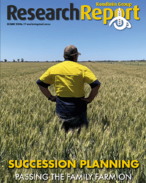This article is 2 years old. Images might not display.
GIWA's November crop report says 23,967,000 tonnes is expected to be harvested, with harvesters already busy at work in the west.
GIWA says harvest is later than normal in WA due mainly to cool and mild conditions in spring.
"Whilst this is frustrating for some growers wanting to get their crop off, it has fuelled extra tonnes that will likely see this harvest exceed 2021's record production," the November report stated.
The mild finish to the season and rain in late August and early September, have combined to finish off a near perfect season across many grain growing regions of the state.
Rainfall in the central and southern half of the state over the last two weeks has further slowed the start of harvest and is now beginning to cause trouble with lodging, head loss and expected downgrades in quality if the rain persists.
Severe storms across the central grain growing regions in the last few days have further added to the delay in getting started for many growers. Grain loss from hail across the central and southern regions in the last two weeks is starting to add up and, whilst significant for individual growers, is not expected to impact the total tonnage of grain produced in WA from being another record production year.
Very little crop has been harvested to date across WA for this time of the year, although what has been harvested has exceeded expectations by several hundred kilograms per hectare in nearly all cases for canola and wheat. If this continues as harvest marches south, total grain production for WA will exceed the record 24 million tonnes produced in 2021 by a fair margin.
GIWA says canola is an absolute standout across the state mostly due to the good early start and slow finish. With likely production set to nudge four million tonnes, the growing of canola has matured to now be a significant part of the state's farming system from the small start it had around 30 years ago.
GIWA also notes that lupin crops are exceptional across the state, and the small areas of barley and wheat harvested to date are also exceptional, particularly in the low rainfall regions where for many it will be the best year for some time.






















